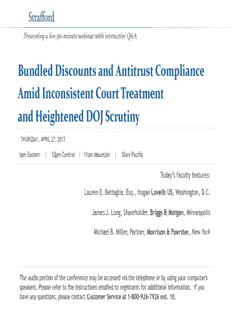
Bundled Discounts and Antitrust Compliance Amid Inconsistent Court Treatment and Heightened ... PDF
Preview Bundled Discounts and Antitrust Compliance Amid Inconsistent Court Treatment and Heightened ...
Presenting a live 90-minute webinar with interactive Q&A Bundled Discounts and Antitrust Compliance Amid Inconsistent Court Treatment and Heightened DOJ Scrutiny THURSDAY, APRIL 27, 2017 1pm Eastern | 12pm Central | 11am Mountain | 10am Pacific Today’s faculty features: Lauren E. Battaglia, Esq., Hogan Lovells US, Washington, D.C. James J. Long, Shareholder, Briggs & Morgan, Minneapolis Michael B. Miller, Partner, Morrison & Foerster, New York The audio portion of the conference may be accessed via the telephone or by using your computer's speakers. Please refer to the instructions emailed to registrants for additional information. If you have any questions, please contact Customer Service at 1-800-926-7926 ext. 10. Tips for Optimal Quality FOR LIVE EVENT ONLY Sound Quality If you are listening via your computer speakers, please note that the quality of your sound will vary depending on the speed and quality of your internet connection. If the sound quality is not satisfactory, you may listen via the phone: dial 1-866-755-4350 and enter your PIN when prompted. Otherwise, please send us a chat or e-mail [email protected] immediately so we can address the problem. If you dialed in and have any difficulties during the call, press *0 for assistance. Viewing Quality To maximize your screen, press the F11 key on your keyboard. To exit full screen, press the F11 key again. Continuing Education Credits FOR LIVE EVENT ONLY In order for us to process your continuing education credit, you must confirm your participation in this webinar by completing and submitting the Attendance Affirmation/Evaluation after the webinar. A link to the Attendance Affirmation/Evaluation will be in the thank you email that you will receive immediately following the program. For additional information about continuing education, call us at 1-800-926-7926 ext. 35. Program Materials FOR LIVE EVENT ONLY If you have not printed the conference materials for this program, please complete the following steps: • Click on the ^ symbol next to “Conference Materials” in the middle of the left- hand column on your screen. • Click on the tab labeled “Handouts” that appears, and there you will see a PDF of the slides for today's program. • Double click on the PDF and a separate page will open. • Print the slides by clicking on the printer icon. BUNDLED PRICING AND LOYALTY DISCOUNTS: NAVIGATING THE CONFUSING ANTITRUST STANDARDS April 27, 2017 Lauren Battaglia James J. Long Michael B. Miller [email protected] [email protected] [email protected] Setting the stage: defining bundled discounts and loyalty discounts and an antitrust primer Lauren Battaglia April 27, 2017 What are bundled and loyalty discounts? Bundled discounts Loyalty discounts • Discounts across 2 or • Discounts tied to more relevant product purchase of percentage markets of buyer’s requirements of one product • Rebates are provided to an account across • Can have a similar product lines based impact as exclusive upon qualifying contracts if discount purchases (a percentage applies to all sales (i.e. of requirements, not just incremental volume or growth) in sales) multiple groups of different products 7 Other examples of pricing practices that can raise concerns under the Sherman Act • Tying – Involves conditioning sale of Product A on the purchase of separate Product B – A and B must be 2 separate products – For there to be an antitrust issue, seller must have market power (typically >30-40% share) in Product A – Concern is that competitors who sell Product B will be foreclosed from the market and competition in the market for Product B will be adversely affected • Exclusive contracts – Concern is potential foreclosure of market to competitors – Unlikely to be an issue if terminable at will or on short notice – But exclusives also can be procompetitive – promotes commitment of parties to work closely together • Predatory pricing – Involves sales at below incremental or average variable cost – Concern is that rivals will be forced to exit the market, and then seller will raise prices 8 Antitrust scrutiny of pricing practices • Lower prices, including through discounting, are generally viewed as positive for consumers and reflective of healthy competition • However, certain pricing practices—even if they involve lowering prices to customers—can undermine competition if they have the effect of foreclosing would-be competitors from competing for a substantial share of the market or excluding equally efficient would-be rivals from competing • This in turn can harm customers by limiting the choices available 9 Primary statutory basis for liability • Sherman Act § 2 – Monopolization – Possession of monopoly power in a relevant market – Acquisition or maintenance of monopoly through exclusionary conduct – Attempt to Monopolize – Specific intent – Predatory conduct – Dangerous probability of monopolization • Issue is under what circumstances can bundled discounts and loyalty discounts be considered exclusionary or predatory conduct? 10
Description: